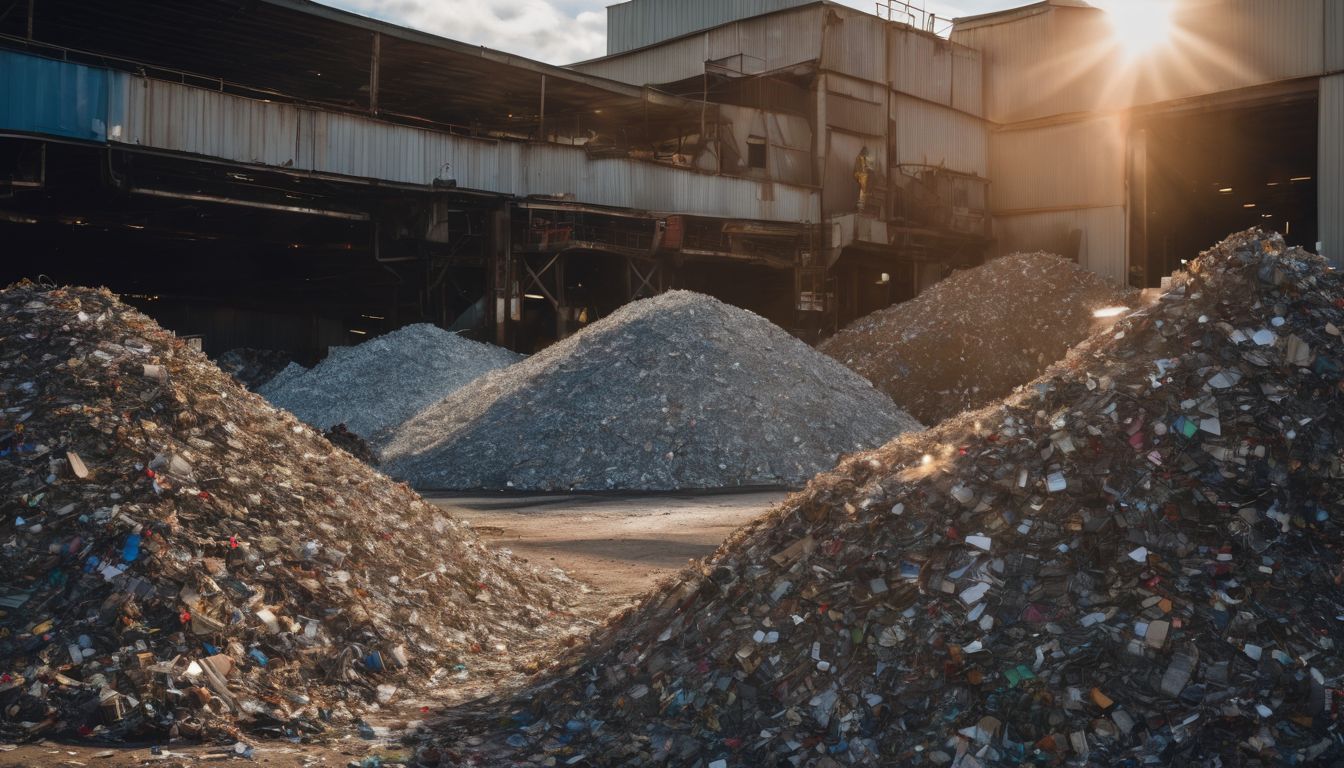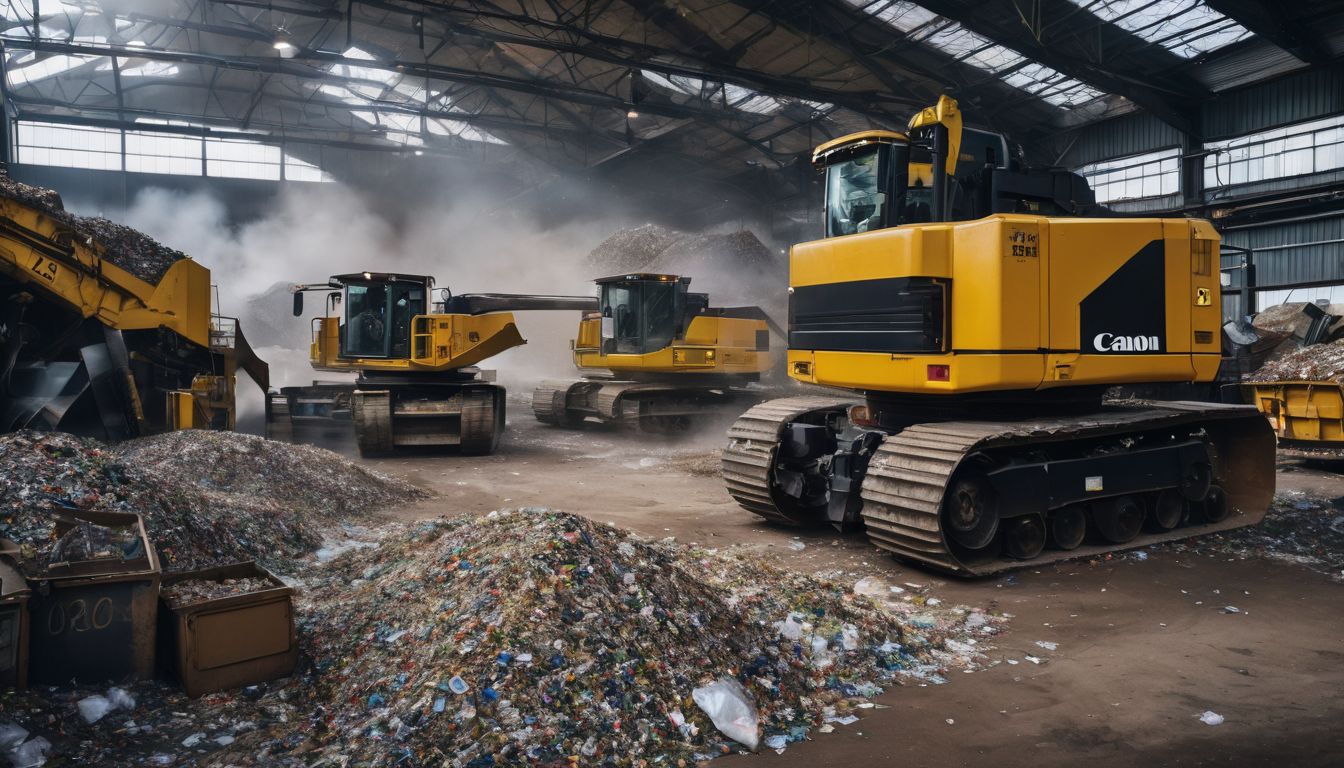Recycling isn’t just about disposing of bottles and boxes—it’s a vital tool for our planet’s health. Every year, recycling prevents millions of tonnes of waste from filling landfills and releasing greenhouse gases.
This article will guide you through the powerful advantages of community-led recycling efforts, showing how small actions can lead to significant change. Dive in to discover how you can make a difference!
Key Takeaways
- Community recycling initiatives fight global warming by cutting greenhouse gas emissions and reduce landfill waste, which conserves energy and inspires green living.
- Recycling programs create jobs within local economies, enhancing community engagement in environmental sustainability efforts while providing meaningful employment.
- These initiatives save natural resources and protect wildlife habitats by reducing the demand for raw materials through the use of recycled products.
- Proper waste management from these programs improves public health by lessening pollution and limiting exposure to harmful substances from waste decomposition.
- Implementing innovative solutions like vertical or underground facilities can help overcome space challenges in urban areas, ensuring the success of recycling efforts.
Benefits of Recycling
Recycling helps tackle climate change by reducing greenhouse gas emissions, creates jobs in the recycling and waste management industry, and saves natural resources for future generations to use.
Tackles climate change
Community recycling initiatives play a crucial role in the fight against global warming. They reduce greenhouse gas emissions by limiting the need for new materials and lowering the amount of waste that ends up in landfills.
This process also conserves energy since producing items from recycled materials often requires less energy compared to making them from virgin raw materials. By engaging local residents in green living practices, these programs foster environmental stewardship and inspire others to take action towards creating a more sustainable future.
Every bottle, can, or piece of paper recycled is a step towards curbing climate change. With each community’s effort, we move closer to reducing our carbon footprint and protecting our planet for generations to come.
The positive impact on the environment is immediate and substantial – showing just how powerful collective actions can be. Moving beyond climate considerations, recycling also spurs economic growth by generating jobs within the local economy.
Creates jobs
Recycling initiatives create job opportunities within local communities, promoting economic growth and stability. By establishing recycling programs, new positions for waste management, sorting, and processing are generated.
The demand for skilled workers in sustainable industries grows as more materials are recycled and repurposed. These jobs not only contribute to the local economy but also provide meaningful work that supports environmental conservation efforts.
Furthermore, the employment of individuals within recycling initiatives strengthens community engagement and encourages a sense of ownership in environmental sustainability. As more people become involved in green initiatives through job creation, the overall impact on reducing solid waste while supporting local economies is enhanced.
Saves natural resources
Recycling conserves natural resources by reducing the need for raw materials, thus protecting forests and wildlife habitats. It also significantly lessens energy consumption in production processes, decreasing greenhouse gas emissions and contributing to a healthier environment.
By using recycled materials, we can mitigate the impact of resource extraction and lessen the strain on ecosystems while promoting sustainability.
Community recycling initiatives are vital in safeguarding our finite resources for future generations. They represent a tangible effort towards conserving natural resources, inspiring local economies to embrace eco-friendly practices that reduce waste and support environmental preservation.
Community Recycling Programs
Community recycling programs play a vital role in waste management, public health, and sustainability. These initiatives aim to reduce solid waste and promote the reuse of materials within local communities.
Importance of waste management
Waste management is crucial for safeguarding public health and conserving the environment. Proper waste management reduces pollution, protects habitats, and prevents hazardous materials from contaminating soil and water sources.
Recycling initiatives minimise the amount of waste that ends up in landfills, contributing to cleaner surroundings and healthier communities.
Effective waste management also encourages resource conservation, ensuring that natural resources are utilised sustainably for future generations. By promoting recycling efforts within local communities, individuals can actively participate in reducing solid waste and greenhouse gas emissions while supporting economic growth through job creation in the recycling industry.
Impact on public health
Recycling programmes play a critical role in safeguarding public health by reducing the amount of waste that ends up in landfills, which can harbour disease-carrying organisms. By diverting recyclable materials from landfills through community recycling initiatives, we can significantly decrease the risk of pollution and contamination to our air, water, and soil.
Moreover, such efforts contribute to minimising exposure to harmful chemicals and toxins released from decomposing waste materials, thereby promoting healthier living environments for communities.
Community recycling initiatives directly enhance public health by lessening the need for new raw material extraction and manufacturing processes. This reduction in resource extraction helps preserve natural habitats and biodiversity while mitigating the environmental factors that contribute to respiratory issues and other health concerns.
Sustainability and profitability
Community recycling programs play a crucial role in promoting sustainability and profitability. By diverting waste from landfills, these initiatives contribute to the conservation of natural resources and reduction of greenhouse gas emissions.
Moreover, community engagement in recycling efforts supports the local economy by creating jobs and promoting the use of recycled materials. Through effective communication and motivation, environmentally conscious individuals can drive eco-friendly practices that benefit both the environment and the community’s economic well-being.
The economic benefits of community recycling go hand in hand with its environmental impact. As more people participate in local recycling solutions, there is a solid reduction in waste generated, leading to lower disposal costs for municipalities while also providing opportunities for businesses to thrive by using recycled materials in their operations.
Strategies for Successful Community Recycling
Conducting waste audits helps communities identify where recycling efforts are needed most, while commercial recycling regulations and using recycled materials in construction can further enhance sustainability.
Encourage community engagement and learn more about the impact of effective recycling initiatives by reading the full article!
https://www.youtube.com/watch?v=rRcgywCg4ME
Waste audits
To effectively manage waste in the community, waste audits play a crucial role, providing valuable insights into the types and quantities of waste generated. It helps in identifying opportunities for improvement and optimising recycling efforts.
- Identification of waste streams: Waste audits help in categorising and quantifying different types of waste, such as paper, plastic, glass, and organic matter.
- Assessment of contamination levels: By conducting waste audits, it becomes possible to evaluate the level of contamination in the recyclable materials, which aids in improving sorting processes.
- Evaluation of recycling programme effectiveness: Waste audits assist in assessing the effectiveness of existing recycling programmes by determining the amount and types of materials being recycled.
- Identification of potential cost savings: Through waste audits, potential cost savings can be identified by reducing unnecessary waste generation and optimising resource allocation.
- Creation of targeted recycling initiatives: The data obtained from waste audits enables communities to create targeted recycling initiatives aimed at specific materials or areas with high waste generation.
- Promotion of public awareness: Waste audit results can be used to raise public awareness about recycling practices and encourage behavioural changes among residents.
Commercial recycling regulations
Commercial recycling regulations play a crucial role in promoting sustainable waste management and reducing environmental impact. They ensure that businesses comply with recycling requirements, contributing to solid waste reduction and greenhouse gas reduction. These regulations also support the local economy by promoting the use of eco-friendly materials and fostering a culture of environmental responsibility.
- Compliance with recycling standards ensures that businesses actively participate in solid waste reduction efforts, promoting sustainability within their communities.
- Commercial recycling regulations create a level playing field for businesses, encouraging fair competition through eco-friendly practices.
- By mandating the use of recycled materials, these regulations stimulate demand for sustainable products and contribute to the conservation of natural resources.
- Enforcement of commercial recycling regulations fosters community engagement by instilling a sense of responsibility towards sustainable practices among businesses and individuals.
- These regulations provide an avenue for communication and motivation, driving continuous improvement in recycling efforts through regular audits and updates to compliance standards.
- Implementation of commercial recycling regulations supports job creation through the expansion of the green economy, offering opportunities in recycling industries and related fields.
Use of recycled materials in construction
- Recycled concrete: Crushed concrete can be used as a base material for roads and buildings, reducing the need for virgin aggregates.
- Reclaimed wood: Using salvaged timber in construction prevents deforestation and promotes sustainable forestry practices.
- Recycled glass: Incorporating crushed glass into building materials reduces energy consumption and greenhouse gas emissions.
- Recycled metal: Reusing scrap metal in construction decreases the need for mining and refining raw ores, conserving natural resources.
Challenges and Solutions for Community Recycling
Limited space in urban areas poses a challenge for community recycling efforts, but innovative solutions such as vertical and underground recycling facilities can help overcome this.
Disaster management and recovery also present challenges, but proactive planning and collaboration with local authorities can ensure that community recycling initiatives continue to thrive even during difficult times.
Limited space in urban areas
Limited space in urban areas presents a significant challenge for community recycling initiatives. However, innovative solutions such as compacting waste, implementing vertical or underground recycling facilities, and utilising advanced sorting technologies can help overcome this hurdle.
By maximising the use of available space, communities can continue to promote sustainable practices and minimise environmental impact while addressing the limitations posed by urban settings.
Additionally, fostering partnerships with local businesses and government entities can facilitate the repurposing of underutilised spaces for recycling efforts. By collaborating on shared objectives, such as creating designated collection points or integrating recycling facilities within existing infrastructure, communities can effectively navigate limited urban space to ensure the success of their recycling initiatives.
Disaster management and recovery
Limited space in urban areas can pose challenges but with effective disaster management and recovery plans, community recycling initiatives can overcome such obstacles.
- Establishing emergency response protocols for recycling facilities ensures quick recovery after disasters, maintaining sustainable waste management despite unexpected events.
- Implementing resilient infrastructure and backup systems can safeguard recycling operations during disasters, minimising disruptions to the recycling process.
- Collaborating with local authorities and emergency services to develop evacuation strategies for recycling facilities protects both the environment and public safety.
- Incorporating disaster – resistant designs into recycling facilities enhances their ability to withstand natural calamities, ensuring continuous operation even in challenging circumstances.
- Engaging in community education and outreach on disaster preparedness instils a sense of responsibility for environmental conservation amid adversity, fostering resilience in the face of challenges.
Conclusion
In conclusion, community recycling initiatives provide numerous benefits for the environment and society. These efforts tackle climate change, create employment opportunities, and conserve natural resources.
By engaging in recycling programs, communities promote sustainability, support local economies, and contribute to a healthier planet. Joining forces in these eco-friendly endeavours not only communicates a commitment to environmental conservation but also motivates others to take action towards a greener future.
FAQs
1. How does community recycling benefit the environment?
Community recycling reduces waste, conserves natural resources, and minimises the environmental impact by reusing materials.
2. Can recycling initiatives create jobs in my local area?
Yes, setting up and maintaining community recycling programmes can support the local economy by creating job opportunities.
3. Why is it important for communities to engage with recycling?
Community engagement promotes sustainability as people work together to protect their environment and motivate each other in eco-friendly efforts.
4. What is the role of communication in successful community recycling initiatives?
Effective communication helps to inform and encourage residents about the benefits of participating in local eco-friendly practices like recycling.





